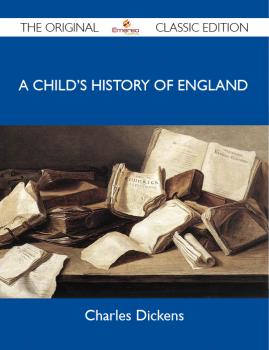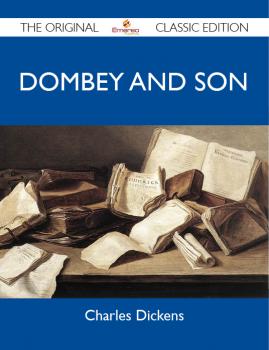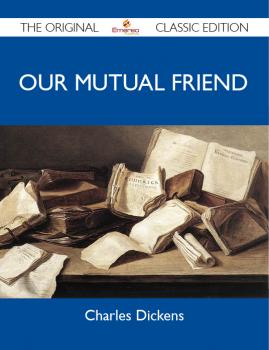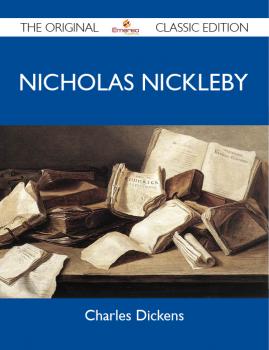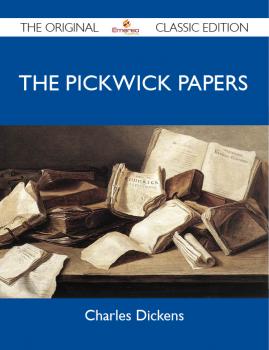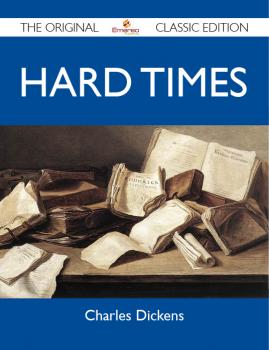Dickens Charles
Список книг автора Dickens CharlesA Child's History of England - The Original Classic Edition
This book is a delightful history of England. It is a book for all ages. As an adult I have enjoyed reading the book for pure pleasure. My two teenage daughters have used this book numerous times for school projects, especially for their history and compostion classes. <p> I never appreciated Charles Dickens as such a charming writer until I read this book, so after reading this, as an adult, I went back to his most familiar books and found that I still enjoyed this one best! It is written like he is an oral storyteller and is so engrossing as to make it difficult to put down. <p> I originally thought due to the title that I would just read it aloud to my girls but I found when they had fallen asleep I couldnt stop and have since read this book at least three times and bought a used copy for all my nieces and nephews. <p> His descriptions of the wars with the thousands of dead contrast sharply with the clean wars of today. Fields with thousands lying slaughtered is incomprehensible. Life was so cheap then at least as described by Dickens. <p> This is such an engrossing history but with so much strong opinion it certainly wouldnt pass muster in todays historical circles which is part of why it is so fun and dare I say naughty to read. <p> One of the most enjoyable books I have ever read!
Dombey and Son - The Original Classic Edition
Upon finishing Dombey and Son this morning, I thought back to the first Dickens work I ever read, which was David Copperfield, as a freshman in high school. Since then I have read many others, all with the same extensive cast of characters, side plots, etc..... <p> Except this one....which makes me question why it is not used as an introduction to the works of Dickens in school curriculums. <p> Dombey and Son, as a title, refers to the business which provides wealth, title, and position to Mr. Dombey, the aforementioned father. The son refers to a succession of partners in that business, as well as an arrival at the opening of the book, which leads to the demise of Mrs. Dombey. But little Paul Dombey, sharing in his fathers first and last names, joins an already present sibling in the world, his sister Florence. <p> Through the course of the novel, you realize that Dombey and Daughter are really the focus of this story....the fortunes and misfortunes that befall them both, the grievous neglect of one for the other, despite the efforts of the one neglected to reconcile…and a host of others that enter and exit from their lives. <p> But to recapture and jusitfy my initial point, this book is a marvelous starting point to read Dickens. It is far easier to keep track of the cast of the story, as it is more limited than other Dickens novels, while sharing the same length as most others. The story lines all really do feed into the central plot, and while the comedy that I so enjoy in Dickenss prose is, admittedly, more limited here…it still is a highly enjoyable tale, and a great place to get your feet wet with one of historys best tale-weavers. <p> Although bittersweet and melancholy in tone, for the majority of the story, Dombey and Son holds up with Dickenss other novels as a true classic.
Three Ghost Stories - The Original Classic Edition
So often we get caught up reading The Great Dickens. Its easy to miss these smaller gems that endeared him to so many readers of his day. <p> Dickens writing is to the eye, what satin is to the hand. <p> <p> This is a high quality book of the original classic edition. <p> This is a freshly published edition of this culturally important work, which is now, at last, again available to you. <p> Enjoy this classic work. These few paragraphs distill the contents and give you a quick look inside: <p> On my trusting that he would excuse the remark that he had been well educated, and (I hoped I might say without offence) perhaps educated above that station, he observed that instances of slight incongruity in such wise would rarely be found wanting among large bodies of men; that he had heard it was so in workhouses, in the police force, even in that last desperate resource, the army; and that he knew it was so, more or less, in any great railway staff. <p> …In a word, I should have set this man down as one of the safest of men to be employed in that capacity, but for the circumstance that while he was speaking to me he twice broke off with a fallen colour, turned his face towards the little bell when it did NOT ring, opened the door of the hut (which was kept shut to exclude the unhealthy damp), and looked out towards the red light near the mouth of the tunnel. <p> …Without prolonging the narrative to dwell on any one of its curious circumstances more than on any other, I may, in closing it, point out the coincidence that the warning of the Engine-Driver included, not only the words which the unfortunate Signal-man had repeated to me as haunting him, but also the words which I myself?not he?had attached, and that only in my own mind, to the gesticulation he had imitated. <p> …I had got into the train at midnight, and had fallen asleep, and had woke up and had sat looking out of window at the brilliant Northern Lights in the sky, and had fallen asleep again, and had woke up again to find the night gone, with the usual discontented conviction on me that I hadn?t been to sleep at all;?upon which question, in the first imbecility of that condition, I am ashamed to believe that I would have done wager by battle with the man who sat opposite me. <p> …Now, although I regard with a hushed and solemn fear, the mysteries, between which and this state of existence is interposed the barrier of the great trial and change that fall on all the things that live; and although I have not the audacity to pretend that I know anything of them; I can no more reconcile the mere banging of doors, ringing of bells, creaking of boards, and such-like insignificances, with the majestic beauty and pervading analogy of all the Divine rules that I am permitted to understand, than I had been able, a little while before, to yoke the spiritual intercourse of my fellow-traveller to the chariot of the rising sun.
Martin Chuzzlewit - The Original Classic Edition
With this novel, Dickens left behind the shallow characters that sometimes marred his early works, and developed full-fledged people. Pecksniff and his daughters are marvelous creations that make one cringe with embarassment while laughing at their incredible selfishness. Tom Pinch is another character in a distinguished line of too good to be true Dickensian personalities, but he is shown to suffer and grow into a believable human being. The American episodes are biting in their satire, but overall they are on the money. Dickens contempt for American armchair philosophers and freedom-loving slave owners fueled some of his most pointed social commentary. As always, there is a happy ending, but the plot is more complex than anything Dickens had written before. I have read Pickwick Papers, Oliver Twist, Nicholas Nickleby, The Old Curiousity Shop, and Barnaby Rudge, and Martin Chuzzlewit ranks right up there with his best. <p> Martin Chuzzlewit is a funny, memorable, and insightful book with a story of hypocrisy, family intrigue, selfishness, loyalty, and friendship. Dickenss use of language is precise and often stinging. The book is laced with humor in the service of more profound goals. Great read because of the combination of humor, satire, memorable characters (most especially the resolutely jolly Mark Tapley and the hypocritical Mr. Pecksniff), and a thoroughly entertaining plot.
The Mystery of Edwin Drood - The Original Classic Edition
It is so strange to see a long, well-plotted novel suddenly come to a dead stop. (Of a projected twelve episodes, Dickens wrote six before his death.) The title character is either murdered or missing, and a large cast of characters in London and Cloisterham (Dickenss Rochester) are involved in their own way in discovering what happened to Edwin Drood. <p> There is first of all John Jasper, an opium addict who suspiciously loves Droods ex-fiancee; there is a nameless old woman who dealt him the opium who is trying to nail Jasper; there is a suspicious pile of quicklime Jasper notices during a late night stroll through the cathedral precincts; there is Durdles who knows all the secrets of the Cathedral of Cloisterhams underground burial chambers; there is the deputy, a boy in the pay of several characters who has seen all the comings and goings; there are the Anglo-Indian Landless twins, one of whom developed a suspicious loathing for Drood; there is the lovely Rosebud, unwilling target of every mans affections; and we havent even begun talking about Canon Crisparkle, Datchery, Tartar, and a host of other characters. All we know is that the game is afoot, but well never know the outcome. <p> It would have been nice to know how Dickens tied together all these threads, but we can still enjoy THE MYSTERY OF EDWIN DROOD because – wherever Dickens was heading with it – it is very evidently the equal of his best works. Life is fleeting, and not all masterpieces are finished
Our Mutual Friend - The Original Classic Edition
Charles Dickenss 1865 novel, his last completed novel, Our Mutual Friend is an extraordinarily dark and convoluted work. Featuring such unforgettable figures as Mr. Boffin, Mr. Podsnap, Bradley Headstone, Jenny Wren, and Silas Wegg, Dickens continues, or rather concludes his artistic legacy with a work rich in well written and compelling characters. Exploring, as do many of Dickenss works, the intricacies of inheritance, Our Mutual Friend is also deeply concerned with families and the things that hold them together or rip them apart. Interesting and fraught emphases on education, upholding particularly English interests in the face of the still rising British Empire, and concerns about the absolute uncertainties about life and death, this is quite a way to come at a last complete novel. <p> Our Mutual Friend begins with Lizzie and her father Gaffer Hexam patrolling the river in the dark of night. Pulling a body out of the river for the potential reward money, the novel jumps right into the action with a bang. The body is presumed to be that of young John Harmon, just returned from South Africa to claim a huge inheritance from his recently deceased, hateful and miserly father. The only heir dead, the elder Harmons loyal employees, Mr. and Mrs. Boffin stand next in the will to inherit everything. This causes a stir in Society, where Mortimer Lightwood, the legal executor of the will, and his friend Eugene Wrayburn are called in to view the body and question Gaffer Hexam. This causes two others to be drawn into the plot – Lizzie Hexam, an uneducated, but prescient young woman, who immediately catches Wrayburns eye, and Miss Bella Wilfer, a sprightly young woman whose marriage to young John Harmon was the sole condition for that gentleman to come into his inheritance prevented by his untimely death. The novel tries over the next pages to work out the personal ramifications of the murder, the will, and the fates of these two young women. <p> Just to kind of continue this theme, one may be particularly interested in the kinds of literary funds that Dickens draws on in Our Mutual Friend: His debt to 18th century literature is heavy indeed, with the works of the poet James Thomson and the historian Edward Gibbon coursing through the novel like the very Thames itself, laying the groundwork for literary and historical commentary on the nature of Empire and particularly British Imperial interests, and how those interests reach from the international into the lives of individuals. Another important predecessor in this line is the infamous Mr. Podsnap, a very dark descendant of Laurence Sternes Corporal Trim from Tristram Shandy. Trims famous flourish, in Podsnaps hands acquires the power to annihilate entire nations. Dickens also reveals heavy debts to fairy tales and nursery rhymes that continue and complicate the novels emphasis on childrens educations, how they are managed, and the impact that they can have on the world as it will become. <p> If you arent interested in reading Our Mutual Friend yet, you should be! You will be hard pressed anywhere in Dickens, (or anywhere else for that matter), to find a more frenetic villain than Mr. Bradley Headstone – to see him in action alone makes this novel worth reading. He ranks right up there with David Copperfields Uriah Heep in terms of Dickenss most insistently horrifying creations. Ok. Enough from me, go, read Our Mutual Friend. What are you waiting for! Go, now!
Nicholas Nickleby - The Original Classic Edition
One of the most entertaining novels ever. This Dickens book is up there with Great Expectations and David Copperfield as one of his most enjoyable novels. <p> The social axe that Dickens had to grind in this story is mans injustice to children. Modern readers my feel that his depiction of Dotheboys Academy is too melodramatic. Alas, unfortunately, it was all too real. Charles Dickens helped create a world where we cant believe that such things happen. Dickens even tells us in an introduction that several Yorkshire schoolmasters were sure that Wackford Squeers was based on them and threatened legal action. <p> The plot of Nicholas Nickleby is a miracle of invention. It is nothing more than a series of adventures, in which Nicholas tries to make his way in the world, separate himself from his evil uncle, and try to provide for his mother and sister. <p> There are no unintersting characters in Dickens. Each one is almost a charicature. This book contains some of his funniest characters. <p> To say this is a melodrama is not an insult. This is melodrama at its best. Its a long book, but a fast read.
The Pickwick Papers - The Original Classic Edition
Charles Dickens wrote The Pickwick Papers in his early 20s, but the writing is first rate and as witty as any seasoned author could have done in his place! Like many of Dickenss works, Pickwick was published in monthly installments, or numbers as they were called then. Although Dickens originally intended to end the story at the twentieth number, the popularity of the series (and the resultant income) convinced Dickens to double the length to forty numbers. The end result is a large offering thatll take you a while to get through. <p> Despite its length, Pickwick never tries your patience. Its delightfully humorous from beginning to end. Samuel Pickwick is the bumbling, middle-aged, wealthy namesake of this novel. Hes the leader of a small group of single men that gets into all sorts of mischief, both physical and social. Booze is rampant. Apparently liquor back then was much more a part of daily life than today; everywhere these guys go they party and get drunk. They get into trouble with the law, women, unsavory characters, and more. <p> Characterization is superb. This is one of the few novels youll read for which you can actually say that you got to know the characters. In most books the characters remain two-dimensional and the plot is what carries the story. In Pickwick, the *characters* are the essence of the story and the novel wouldnt be memorable at all if a lesser author were attempting to breathe life into these people. <p> Highly recommended, particularly if you enjoy classic literature! Dickenss later works overshadow this gem due to their maturity, but Pickwick beats them all in enthusiasm, humor, and wit.
Hard Times - The Original Classic Edition
Like all Charles Dickens novels Hard Times features some great, memorable characters. The setting of the industrial city of Coketown is vividly described as a miserable, polluted town. There are some strong themes of class struggles between the working men in the factories and the harsh upper classes who seek to exploit them. Nearly all of the upper class characters are depicted in a negative light while the real heroes of the story are from the working class. As always, Dickens finds an entertaining way to shine a bright light on the social problems of Victorian-era England. <p> Hard Times isnt like Dickenss other novels, Dickens endured himself much further to with this novel as he has his characters perform Thomas Carlyles enduring philosophy. <p> The novel follows the Gradgrind family who is raised adhering to FACTS and living in a society which worships the manufacturing machine. As the novel progresses, connections are made and broken, and the characters come to the realization that there is much more to reality than the material facts. <p> Hard Times is told so compassionately. The reader cares for these people and their tragic lives. The story is also told with biting humor that still cuts at todays society (this novel feels really modern), and the underlying philosophy is one which is so needed in our post-modern world. <p> You will thoroughly enjoy this novel and highly recommend it.
Bleak House - The Original Classic Edition
Bleak House is long, tightly plotted, wonderfully descriptive, and full of memorable characters. Dickens has written a vast story centered on the Jarndyce inheritance, and masterly manages the switches between third person omniscient narrator and first person limited narrator. <p> In this book a poor boy (Jo) will be literally chased from places of refuge and thus provide Dickens with one of his most powerful ways to indict a system that was particularly cruel to children. Mr. Skimpole, pretending not to be interested in money; Mr. Jarndyce, generous and good; Richard, stupid and blind; the memorable Dedlocks, and My Lady Dedlocks secret being uncovered by the sinister Mr. Tulkinghorn; Mrs. Jellyby and her telescopic philanthropy; the Ironmaster described in Chapter 28, presenting quite a different view of industralization than that shown by Dickens in his next work, Hard Times. <p> Here is a veritable cosmos of people, neighbors, friends, enemies, lovers, rivals, sinners, and saints, and Dickens proves himself a true master at describing their lives and the environment they dwell in. There are landmark chapters: Chapter One must be the best description of a dismal city under attack by dismal weather and tightly tied by perfectly dismal laws, where the Lord Chancellor sits eternally in Lincolns Inn Hall. Chapter 32 has one of the eeriest scenes ever written, with suspicious smoke, greasy and reeking, as a prelude to a grisly discovery. Chapter 47 is when Jo cannot move along anymore. <p> Bleak House is a long, complex novel that opens a window for us to another world. It is never boring and, appearances to the contrary, is not bleak. Enjoy.
